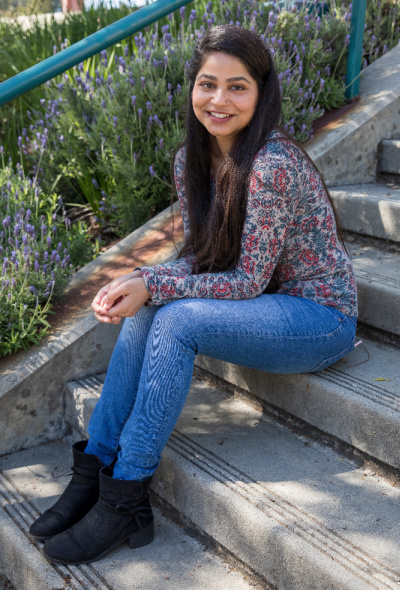Campus News
Campus holds first Sexual Violence Sexual Harassment Research Symposium
UC Santa Cruz will hold its first-ever research symposium — and a first for a UC campus — highlighting research by campus scholars on issues of sexual violence and sexual harassment Friday, April 2.


UC Santa Cruz will hold its first-ever research symposium — and a first for a UC campus — highlighting research by campus scholars on issues of sexual violence and sexual harassment Friday, April 2.
The event is from noon to 3:10 p.m. and is sponsored by the Coordinated Community Review Team. It will be held virtually and is open to all students, staff, and faculty. The address for registration is http://bit.ly/3vaqItA. A website with more information and a complete schedule is here.
The symposium will also be the first campus event for Sexual Assault Awareness Month, an annual campaign to raise public awareness about sexual assault and to educate on how to prevent sexual violence on campus. This April marks the 20th anniversary of the first Sexual Assault Awareness Month, or SAAM, nationwide.
Nine research presentations are scheduled in three panels. Subject areas include affirmative consent, prevention of sexual assault in fieldwork settings, romanticized stalking, and gendered experiences and sexual harassment of STEM graduate students.
The symposium is the inspiration of Sona Kaur, a Ph.D. candidate in social psychology, who has served as a graduate intern with the campus Title IX office since September 2019. She first proposed the symposium more than a year ago but it ran into significant logistic delays because of the COVID-19 pandemic.
Kaur said the goal is to link research in the fields of sexual violence and sexual harassment with the practice of education and prevention. “We want to bring researchers and those who actually apply this work into conversation with each other and see how we can really engage in each other’s work,” Kaur said.
“It’s important to share the research happening on campus especially with the Title IX office and Campus Advocacy Resources and Education (CARE) offices,” Kaur said. “We often provide training and workshops on issues such as consent not knowing that others are also engaged in this work but use a different approach. More can be done to foster collaboration between these offices and researchers because we all are invested in these issues — violence and harassment — with the same goal of prevention.”
The onset of the pandemic prevented the symposium a year ago, Kaur said. “This year we thought we would try to make it happen as we are all more familiar with the online remote world.” Beyond organizing the research symposium, Kaur will also deliver a presentation based on her research: “Perceptions of Romanticized Stalking”.
Sexual violence and sexual harassment is pervasive in and impacts college-aged, LGBTQ, and female-identified students at significantly higher rates, researchers have found.
Experts in the field say students impacted by sexual violence and sexual harassment are more likely to experience adverse outcomes, such as those related to mental and physical health. Higher levels of anxiety and depression are common among survivors. Sexual violence and sexual harassment also disrupts students’ academic progress, resulting in absenteeism and lower GPAs and retention rates, they say.
The Coordinated Community Review Team is a broad group that advises campus leadership and the greater community about best practices in policies, education, prevention, and response to these kinds of incidents. Its membership includes Title IX, the Campus Advocacy Resources and Education (CARE) office, Ethnic Resource Centers, graduate and undergraduate student representatives, and off-campus affiliates such as the Walnut Avenue Family & Women’s Center and Monarch Services.
Presentation titles and presenters
Panel 1 (12:15-12:50 p.m.)
Ambivalent Sexism and Violence-Against-Women Attitudes and Behaviors: A Meta-Analysis
Brenda Gutierrez, Ph.D. candidate, Developmental Psychology
Campbell Leaper, Ph.D., Distinguished Professor of Psychology
Perceptions of Romanticized Stalking
Sona Kaur, Ph.D. candidate, Social Psychology & Title IX graduate intern
Eileen L. Zurbriggen, Ph.D., Professor, Psychology
Building a Better Fieldwork Future: An Evaluation of Scenario-Based Bystander
Training to Prevent Sexual Harassment and Assault in Field Settings
Melissa Cronin, Ph.D. Candidate, Ecology & Evolutionary Biology
Roxanne Beltran, Ph.D., Assistant Professor, Ecology & Evolutionary Biology
Erika S. Zavaleta, Ph.D., Professor, Ecology & Evolutionary Biology
Panel 2 (1:10-1:45 p.m.)
Consent in the Erotic Hypnosis Community: Thorny Issues in Sexual Consent
Sam Hughes, Ph.D. Candidate, Social Psychology
Attitudes about Affirmative Sexual Consent and Rape-Supportive Beliefs
Sarah Harsey, Ph.D. Candidate, Social Psychology
Eileen L. Zurbriggen, Ph.D., Professor, Psychology
Harm, responsibility, and ambiguity in judgments about sexual behaviors
Anjuli Corzine, Graduate Student, Clinical Psychology
Audun Dahl, Ph.D., Associate Professor, Psychology
Panel 3 (2:15-2:50 p.m.)
Under-supported and under-reported: Gendered experiences and sexual harassment of STEM graduate students
Giselle Laiduc, M.S., Ph.D. candidate, Social Psychology
Emily Hentschke, Graduate Student, Social Psychology
Anna Sher, Ph.D., Assistant Director for Assessment and Survey Research, Institutional
Research, Assessment, & Policy Studies
Impact of Non-Consensual Sexual Contacts on Suicide Thoughts and Attempts among UCSC Students
Jason Dyer, M.S., Ph.D. Candidate, Developmental Psychology
Gary Dunn, Ph.D., Interim Associate Vice Chancellor, Student Health & Wellness
Rebecca Covarrubias, Ph.D., Associate Professor of Psychology & Faculty Director,
Student Success Equity Research Center (SSERC)
Gwenn Benner, M.P.A, Director, Student Success Equity Research Center (SSERC)
Making Sexual Violence Legible: Student Narratives at UCSC
Alison Hanson, Ph.D. candidate, Anthropology & CARE Prevention Education Coordinator